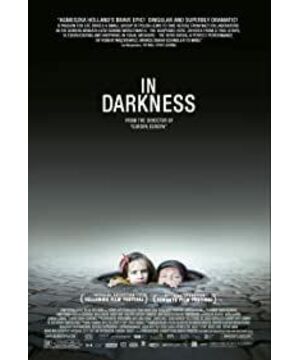The story takes place in Lviv, a small Polish town occupied by German forces. The protagonist Berdyk is a low-level person who works in the urban sewer system and occasionally enters the house to rob him in his spare time. When the German army started shooting the Jews wantonly, Berdek accidentally discovered a tunnel dug by a small group of Jews that was connected to the city's sewer system where he worked. He paid 500 Polish bucks a day and agreed to shelter the dozen or so Jews in the ground. With the deepening of the German army's evil deeds and the accumulation of contact with the Jews, Berdyk went from threatening with money at the beginning to providing free salvation despite the opposition of his partner and his wife, and establishing mutual trust with the Jews until the spring of liberation. .
Through Berdyk's eyes, we saw the urban catastrophe and the human slaughterhouse in the eyes of a lower class. Obviously, his perspective is a more realistic choice among the many "World War II + Jewish" film perspectives. At the scene of disaster, an ant could not take care of the sense of justice that needs to be modified by civilization and morality. And the Jews he saved were not the people with high IQ and high EQ in "Schindler's List". They started with selfishness like Berdyk. This is the emotional tone of the film. The director obviously wants to dig his characters down into the dust first, to accompany the dark sewage and mice, and then soar into the sky with the song of human nature.
The problem is that in the process of digging into the dust and filth, the director has pierced too hard and deep, while the relative human awakening and the light of justice lack a powerful breakthrough and heightened. As a result, the whole film fell into darkness like the title. The whole narrative focus of the story falls on how Berdyk helped the Jews in the sewers avoid searches and the parents' shortcomings among the Jews. But none of these major crises caused a devastating blow to Berdyk's rescue operation. The only reason for the loss of personnel was the escape of the Jews themselves. The director showed us that even the characters in the story want to escape the plot set by the movie, which shows how unsightly the environment and current situation of the sewers are. As a result, the audience was forced to, like those Jews hiding in the sewers, from beginning to end in the main part of the film, for a full 9 months, just waiting for the last two minutes to see the sun again. Fortunately, in the end Berdyk and his Jews really ushered in the dawn of victory. The pleasure of watching movies is no longer there, but the human meaning of religion can finally overcome the despair and boredom of waiting calmly and smelly, and breathe fresh air. This can also be considered to inspire the audience to make some useful thinking.
Originally published in "Universal Screen" Issue 302 Joe Wine
View more about In Darkness reviews











